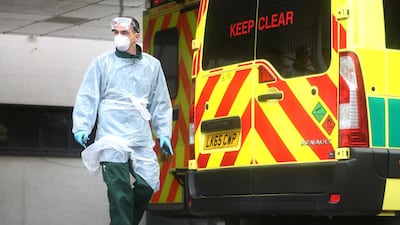Dr Budoor Al Budoor, a clinical fellow at King's College Hospital in London, opted to remain on the frontlines of the UK's coronavirus emergency
The Emirati intensive care doctor in London has explained that she felt it was her duty to stay at her post as the UK grapples with the mounting public health emergency posed by the novel coronavirus.
Dr Al Budoor told The National her decision to stay had been an emotional one even if her reasons to stay far outweighed those for returning to the UAE.
“It felt very counterintuitive for me, at a time of need, to be leaving my post,” Dr Al Budoor said. “I felt like it was my duty and it comes with the territory. If you were working in the ICU and you have chosen to do this, it doesn't seem right for me to be leaving when I chose to do that with my life.”
The 32-year-old, whose family reside in Dubai, has been working as a fellow at the central London hospital since August 2018 and decided to remain with her team as Britain’s capital became the epicentre of the country’s coronavirus outbreak.
“My team here have been more than great,” the intensive care specialist explained. “It has been like a family really.”
“I am in a better position being young and otherwise healthy,” she added. “If I can see that some of my older doctors are still out there on the frontlines it is very inspirational.”
King’s College Hospital, like all of the UK’s hospitals, has undergone a rapid transformation to deal with the coronavirus outbreak. Dr Al Budoor explained that her hospital post-surgery recovery areas have been converted to increase intensive care capacity.
Doctors who do not normally work in intensive care have been redeployed to help the most acute patients as the need increases. One intensive care unit is now taking cases that would typically be distributed across four ICUs.
On Wednesday the British government announced the number of people to have died with coronavirus in the country had increased by 563 to a total 2,352. Authorities in the UK have also confirmed 29,474 confirmed cases of the virus, up from 25,150 the day before.
Despite the huge impact the coronavirus has had on Britain’s National Health Service (NHS), Dr Al Budoor explained that her team have not yet been overwhelmed in their intensive care facilities.
“We know we are not seeing the worst of it yet but it is quite busy,” she said. “We are trying not to compromise on the usual patient care but it is becoming difficult,” Dr Al Budoor added. “There is very little time for us to make these decisions compared to what we usually do.”
The ICU doctor explained that the vast majority of those brought into intensive care with Covid-19 had underlying health issues. However, some young and otherwise healthy patients are being affected by the disease.
The UK’s youngest coronavirus fatality was treated at King’s College Hospital. Ismail Mohamed Abdulwahab, a 13-year-old boy from London, who was killed by the virus did not have any pre-existing health conditions before he was admitted and put on a ventilator.
Doctors and other healthcare workers also find themselves at particular risk from the disease. Dr Al Budoor said despite the challenges morale remains high.
“We know that eventually every one of us might get sick so we support each other during this time,” the intensive care specialist said. “Because everyone has been supportive it has been manageable. But everyone has their own thoughts and fears.”











